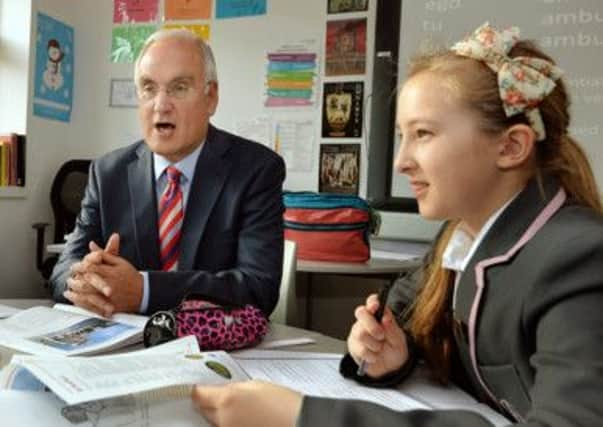Ofsted supremo calls for axed Sats tests to be brought back


As he launched his second annual report, Sir Michael Wilshaw said scrapping the tests had been a mistake.
The chief inspectors of schools also announced that for the first time schools with behaviour problems will face unannounced inspections to crack down on disruption in the classroom.
Advertisement
Hide AdAdvertisement
Hide AdEngland’s schools are suffering from a culture of “casual acceptance” of misbehaviour and lessons should not be undermined by “background chatter, inattention and horseplay”, he warned.
Ofsted’s annual report, which was published yesterday along with regional reports from across England, concludes that the education system is gradually improving, with almost eight out of 10 schools now rated as good or better.
But nearly a quarter of a million pupils are still forced to go to failing schools, and a further 1.5 million are being taught in schools that require improvement.
There are three factors hindering progress, Ofsted suggested: too much mediocre teaching and weak leadership; regional differences in the quality of education; and the underachievement of poor children, especially white youngsters.
Advertisement
Hide AdAdvertisement
Hide AdSpeaking as he published his report, Sir Michael said it was important to know how pupils are doing at certain stages of their education if England is to keep up with the rest of the world.
“I am calling on the Government to re-introduce more formal external testing at the end of key stage one.
“Indeed, I would strongly urge the Government to re-introduce external testing at key stage three as well.
“Talk to any good headteacher and they will tell you it was a mistake to abolish those tests. That’s because good teachers use those tests to make sure every child learns well.
Advertisement
Hide AdAdvertisement
Hide Ad“In getting rid of the tests, we conceded too much ground to vested interests. Our education system should be run for the benefit of children, and no-one else.
“With the proposed abandonment of national curriculum levels, it is vital that children’s progress and outcomes are benchmarked at regular intervals in their school career.
“If we are serious about raising standards and catching up with the best in the world, we need to know how pupils are doing at seven, 11, 14 and 16.”
Sir Michael said one of the “salutary lessons” of international education rankings published last week was that one of the best European performers was Poland, which he said has introduced more national testing of pupils.
Advertisement
Hide AdAdvertisement
Hide AdUnder the current system, pupils’ performance in English and maths at the age of seven (the end of key stage one) is assessed by their teachers.
Currently, pupils sit national curriculum tests – known as Sats – in reading and maths at age 11, as well as one in spelling, punctuation and grammar. Writing skills are assessed by teachers. A reading check has also been brought in for six-year-olds.
Pupils previously sat externally-marked tests at the age of seven, but these were also phased out.
Sats tests for 14-year-olds (the end of key stage three) were axed by Labour in 2008. At the time, the then Schools Secretary Ed Balls said tests were becoming “less and less relevant”.
Advertisement
Hide AdAdvertisement
Hide AdThe general secretary of the National Union of Teachers was among those who criticised Sir Michael’s call for formal testing of seven year-olds to be reinstated.
Christine Blower said: “Recommendations to bring in formal testing at key stage one is an unhelpful step. We already have formal assessment in the early years and the phonics check at age five. This is too much testing too soon.
“Despite the fact that 90 per cent of countries around the world begin formal schooling at age six or seven, in England the belief prevails that starting sooner will lead to better results later.”
Town hall bosses have welcomed Ofsted’s annual report showing that primary schools are improving.
Advertisement
Hide AdAdvertisement
Hide AdCoun David Simmonds, chairman of the Local Government Association’s Children and Young People Board, said: “We know primary schools are improving at a rapid rate and we are pleased to see the Chief Inspector’s recognition of this. Mums and dads can feel confident of the education their children are receiving and it is a tribute to all who work in primary schools that there is a recognisable lift in the standard of education.”
However he voiced concern about the Department for Education’s ability to be able oversee the growing number of academies.
Comment: Page 12; No excuses for mediocrity: Page 13.